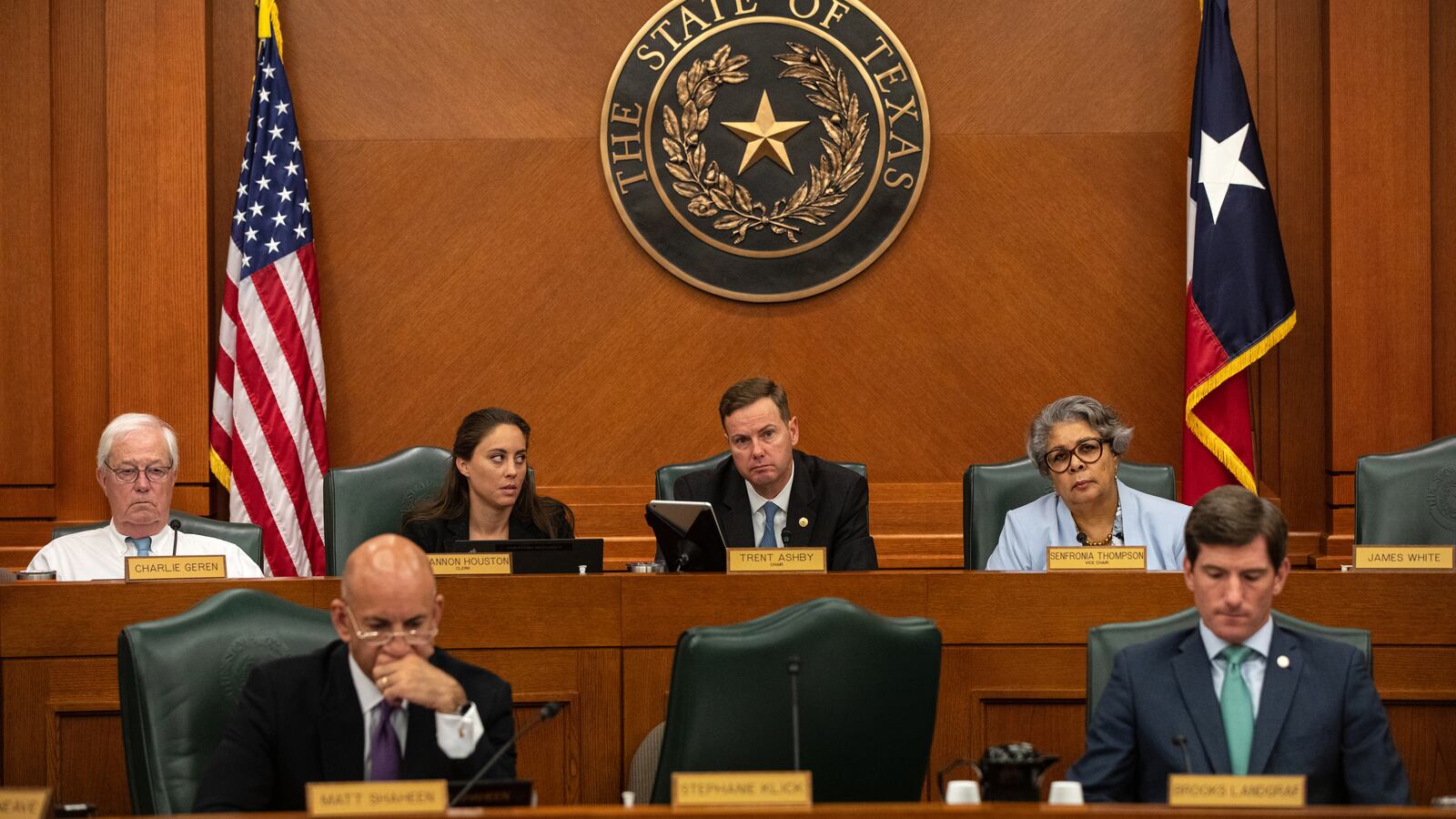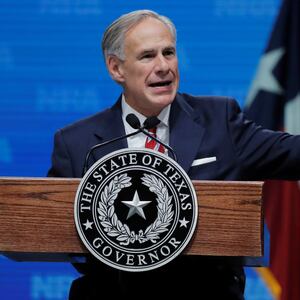Republican lawmakers were forced to admit they have not seen any evidence of widespread election fraud during a Saturday showdown in the Texas State House over restrictive “election integrity” measures being taken up in a special session called by Gov. Greg Abbott.
The move was decried by Democrats as little more than an attempt to suppress minority votes. Experts say that unnecessary election security measures like the ones being proposed in Texas actually do nothing to make elections more secure and disproportionately disenfranchise people of color. Large numbers of opponents showed up on Saturday to officially register their objection to the GOP initiative, including former Rep. Beto O’Rourke.
One of them, a 17-year-old San Antonian named Kyle Huang, began his testimony by saying he was there representing “myself, and I guess my fellow citizens.”
“I just graduated high school and I find myself here today, defending the right to vote, a right that I myself cannot yet exercise, but a right that is under attack,” Huang told the Senate Committee on State Affairs. “When I phone-banked last year, I spoke with many senior citizens who relied on mail-in voting because of a lack of access to transportation and technology. I remember talking to an elderly man who did not have internet access, and he explained that he got a mail-in ballot application because the county sent him one.”
If the county hadn’t sent out the ballot, the man wouldn’t have been able to request one online, Huang said. He also wouldn’t have known who to call to ask about requesting one.
“I realized that if the county hadn’t been proactive about sending out mail-in ballot applications, this man wouldn’t have been able to exercise his fundamental right to vote. And under S.B. 1, the county official who sent him an application would be criminally charged for doing what? Ensuring that all citizens participate in democracy.”

Beto O'Rourke stands with others waiting to testify at the State House on Saturday.
Tamir Kalifa/GettyAbbott previously pushed an election security bill but it was blocked in late May by a Democratic walkout that denied Republicans the quorum they needed for a vote. Undeterred, Abbott announced his intention to call a special session so the bills, S.B. 1 in the Senate and H.B. 3 in the House, could be rammed through. (Some Texas Dems are urging colleagues to pursue a similar strategy this time around.) What Abbott is looking to achieve, among other things, is a ban on 24-hour and drive-through voting, implementing strict new voter ID requirements for mail-in ballots, a prohibition on absentee ballot applications from being sent out proactively, and an expansion of the authority granted to partisan poll watchers.
But in the Senate hearing on Saturday, GOP Sen. Bryan Hughes, committee chair and author of S.B. 1, admitted to Sen. Royce West, a Democrat, that Republicans had not done, nor were they aware of, any studies analyzing the disparate impacts of voting restrictions on people of color.
The exchange followed an admission by Hughes to Democratic State Sen. José Menéndez that he hadn’t spoken with any outside advocacy groups such as the NAACP about how the bill could affect minority voters. There are “some minorities who are Republicans who support the bill,” Hughes noted in response to a subsequent question.
Sen. Borris Miles, a Democrat representing Houston, pointed out to Hughes that organized voter fraud simply does not exist on a significant scale.
“What are we really trying to fix here?” he asked.
Hughes was unable to provide examples of any fraud associated with drive-through voting. He was also at a loss when asked about voter fraud linked to ballot dropboxes, saying, “I think most people agree that putting an important document like a ballot in the hands of an election worker is a lot better than dropping it in some slot overnight unprotected, not knowing what's going to happen to it, I mean, I feel pretty strongly about that.”
As for his proposed ban on 24-hour voting, Hughes said he had not heard of any fraud cases related to the practice during the 2020 presidential election.
“I know that we heard testimony that there was difficulty getting election workers and poll watchers, but I don’t know that [there was] evidence of fraud,” said Hughes.
Keith Ingram, director of the Elections Division at the Texas Secretary of State’s Office, echoed Hughes’ admission that drive-through and 24-hour polling places had not been an issue.
“I don’t think we have any evidence of actual fraud,” he said. “There are discrepancies that resulted because of the failure to check the machines...on a continual basis throughout the voting process. So, there were problems involved with it, but nothing that we’ve seen rises to [the level of] fraud.”
Jonathan White, division chief of the Texas Attorney General’s Election Integrity Division, testified that his office’s main concern was related to anyone “coming between” a voter and the ballot box and attempting to influence their vote. This, he said, tends to involve campaign workers (and occasionally the candidates themselves), and “vulnerable” voters, such as the elderly. The Texas AG has voter fraud cases pending in state court against 44 individual defendants, according to White—but just one is related to the 2020 election. (It is important to note that White’s boss, Texas Attorney General Ken Paxton, is being prosecuted on felony securities fraud charges.)
“Don’t get me wrong, we shouldn’t have fraud at all,” West pressed White, questioning his description of “massive” voter fraud in the state. “But if someone is saying that the building’s on fire, trying to scare people... In the state of Texas, we have 44 defendants. And we had—what was the number in this last election?—over 11 million people to vote.”
That’s a rate of .0004 percent, West noted.
It is the Texas GOP’s second attempt at passing broad new legislation to dramatically limit voters’ access to the ballot box. On Wednesday, Abbott, a staunch supporter of former President Donald Trump, called a special legislative session, which began the next day.
It came on the heels of a regular session during which the Republican-controlled legislature passed some of the nation’s harshest restrictions on abortion rights as well as a law allowing all Texans 21 and older to carry handguns without a license.
With a legislature that has shifted to the right even as the state’s population continues to move left, Texas has been called a bellwether for the rest of the country.
Abbott’s other agenda items read like a laundry list of hot-button conservative grievances: measures to fight “censorship” by social media companies, a proposed ban on teaching critical race theory in public schools, additional restrictions on abortion, increased funding for border security, and a prohibition on transgender students competing in school sports. He is also pushing for more money for property tax relief and cybersecurity initiatives.
The legislation does include a pair of modest concessions to Democrats: an apparatus for “curing” rejected absentee ballots, and the decriminalization of provisional ballots cast by voters such as people convicted of felonies who were unaware their voting rights had not been restored.
The hastily called special session was contentious from the get-go, not least because of the quick turnaround from Abbott’s announcement to opening gavel.
“As a legislature, we represent nearly 30 million Texans who deserve to have full transparency in our legislative process,” Sen. Menéndez said earlier this week. “As a legislative body, we only had 25 hours' notice on what subjects we would be debating, and have not actually seen any language for many of the Governor's priority bills that have been filed. Not only does this give little time to prepare, it gives our constituents and members of the public little time to engage in the legislative process on bills that will have a negative impact on them and members of their community.”
Rep. Chris Turner, chair of the House Democratic caucus, believes Abbott is using his office to advance his political interests instead of looking out for Texans.
“The governor’s agenda for the special session shows he is more concerned with pandering to die-hard Trump supporters and right-wing extremists than he is with serving everyday Texans,” Turner said in a statement.
Abbott is up for re-election next year, and is reportedly considering a presidential bid in 2024. A full vote on S.B. 1 and H.B. 3 could come by the middle of next week.






